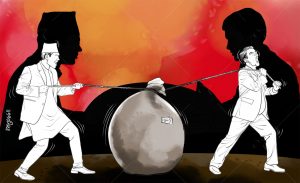
Neocolonialism is a term used to describe the economic and political influence that developed countries exert over developing countries, often through indirect means such as international trade, foreign investment and international aid. Nepal, a small landlocked country located in the Himalayas, has been subject to neocolonialism although it has not been a colony politically.
Consequently, it is making significant negative impacts on the Nepali economy and politics. So it is about time the country thought of the solutions.
Promoting inequality

One of the most significant negative impacts of neocolonialism on the Nepali economy is the unequal distribution of resources and wealth. Developed countries often use their economic power to extract resources from developing countries at a low cost, leaving little for local populations. This has been the case in Nepal, where multinational corporations have been granted access to the country’s natural resources, such as timber and minerals, at a low cost. This has resulted in the depletion of natural resources, environmental degradation, and a loss of revenue for the Nepali government.
Furthermore, neocolonialism has led to the exploitation of Nepali labour. Many multinational corporations have established factories in Nepal, taking advantage of cheap labour and relaxed labour laws. These corporations often pay low wages and provide poor working conditions, leading to the exploitation of workers. This has resulted in a decline in the standard of living for many Nepali citizens.
In addition to the impacts on the Nepali economy, neocolonialism has also had a negative impact on Nepal’s political system. Developed countries often use their economic power to influence the political decisions of developing countries. In Nepal, this has resulted in a lack of political autonomy, with decisions often being made to appease foreign governments and corporations rather than to benefit the Nepali people. This has led to corruption, a lack of transparency and a weakening of democratic institutions.
Moreover, the influence of foreign powers in Nepal’s political system has resulted in a lack of investment in key areas such as education, healthcare and infrastructure. Developed countries often prioritise investments that benefit their own economies, not the Nepali economy. This has resulted in a lack of investment in critical areas, leaving Nepal’s citizens without access to basic services.
Impacts on Nepali economy and politics in detail

Neocolonialism can inflict significant trauma on the Nepali economy and politics. They have been explained below:
- Unequal trade relations: Developed countries often impose unfair trade agreements on developing nations, which benefit the former at the expense of the latter. For example, Nepal’s agricultural sector has been negatively impacted by the influx of cheaper imports of agricultural products from developed countries, making it difficult for Nepali farmers to compete and harming the Nepali economy.
- The exploitation of natural resources: Developed countries often exploit the natural resources of developing nations, often without adequate compensation or benefit sharing. For example, foreign companies have been accused of exploiting Nepal’s hydropower potential without providing adequate returns to the Nepali people and the Nepali economy.
- Debt dependency: Developed countries often provide loans to developing countries, which come with strict conditions that benefit the former. Nepal, like many other developing countries, has become heavily indebted to developed countries and international financial institutions, which has limited its ability to invest in social and economic development.
- Brain drain: Developed countries often attract skilled labour from developing countries, which exacerbates the brain drain problem in these countries. Nepal has been losing its skilled workforce to developed countries, which has limited its ability to develop the Nepali economy.
- Political interference: Developed countries often interfere in the political affairs of developing countries, often to protect their own interests. For example, developed countries have been accused of manipulating elections in Nepal and supporting anti-democratic forces.
- Cultural imperialism: Developed countries often impose their cultural values and norms on developing countries, which can have a negative impact on the latter’s cultural identity. For example, the influence of Western culture has led to the erosion of traditional Nepali values and customs.
- Environmental degradation: Developed countries often engage in environmentally destructive practices in developing countries, often without regard for the local environment or the rights of local communities. For example, foreign companies have been accused of engaging in deforestation and other environmentally destructive activities in Nepal.
Potential solutions

So, to eradicate the effect of neocolonialism on the Nepali economy and politics, Nepal should follow the following measures:
• Diversifying the economy: Nepal’s economy heavily relies on agriculture, tourism, and remittances, making it vulnerable to the external shocks of neocolonialism. Diversifying the economy by investing in new industries, such as technology and manufacturing, could reduce the country’s dependence on these sectors and strengthen its economic independence.
• Promoting fair trade: Nepal could work to promote fair trade practices that prioritise the needs of local businesses and communities over foreign corporations. This could involve developing policies that protect local producers and workers from exploitation and support the growth of domestic industries and the Nepali economy, overall.
• Investing in education: Education is a powerful tool for reducing neocolonialism’s effects by empowering citizens with knowledge and skills to participate actively in their country’s economic and political systems. Nepal could invest in education by increasing access to schools, improving the quality of education, and supporting vocational training programmes that equip young people with relevant skills.
• Strengthening political institutions: Strengthening democratic institutions is an essential step in reducing neocolonialism’s effects on Nepal’s politics. This could involve promoting transparency and accountability in government, increasing civic participation, and supporting the development of independent media that can hold the government accountable.
• Building regional cooperation: Nepal could work to build stronger regional cooperation with neighbouring countries, such as India and China, to reduce its dependence on Western powers on the Nepali economy and politics and increase its bargaining power in international negotiations. This could involve collaborating on infrastructure projects, trade agreements, and cultural exchanges that promote mutual understanding and respect.
Overall, reducing the effects of neocolonialism on the Nepali economy and politics will require sustained efforts across multiple fronts. By diversifying the economy, promoting fair trade practices, investing in education, strengthening political institutions, and building regional cooperation, Nepal can take steps towards greater economic and political independence.
























